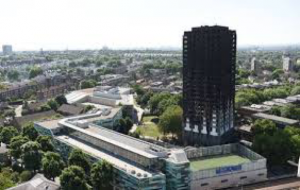By Dave Cowan, Professor of Law and Policy (University of Bristol Law School).
 Following a commission from Shelter, the housing charity, Dave Cowan and Edward Burtonshaw-Gunn, University of Bristol Law School, and Helen Carr and Ed Kirton-Darling, University of Kent Law School, conducted research into the law and practice around housing standards. Their conclusions – which draw on 940 responses to a questionnaire from professionals, landlords and occupiers – make for stark reading about the deficiencies in our current law. This is the Executive Summary to the report. The full report can be found at http://www.bristol.ac.uk/law/research/grenfell/.
Following a commission from Shelter, the housing charity, Dave Cowan and Edward Burtonshaw-Gunn, University of Bristol Law School, and Helen Carr and Ed Kirton-Darling, University of Kent Law School, conducted research into the law and practice around housing standards. Their conclusions – which draw on 940 responses to a questionnaire from professionals, landlords and occupiers – make for stark reading about the deficiencies in our current law. This is the Executive Summary to the report. The full report can be found at http://www.bristol.ac.uk/law/research/grenfell/.
The law relating to health and safety in people’s homes is piecemeal, out-dated, complex, dependent upon tenure, and patchily enforced. It makes obscure distinctions, which have little relationship with everyday experiences of poor conditions. Tenants wanting to remedy defects face numerous and often insurmountable barriers to justice. The law needs to evolve; no longer should occupiers be treated as posing health and safety risks; instead they should be treated as consumers of housing with enforceable rights to ensure minimum standards are adhered to. The state needs to accept its role as the primary enforcer of those standards.
Not only does the law require reform, there also needs to be a cultural change, so that those responsible for the health and safety of occupiers become pro-active in fulfilling those responsibilities.
We recommend a new Housing (Health and Safety in the Home) Act which is tenure neutral, modern and relevant to contemporary health and safety issues, and which encourages and provides resources for pro-activity by statutory authorities. In particular, the Act should
- Strengthen duties on local authorities to review housing and enforce housing health and safety standards
- Introduce a legal duty to review and update all guidance relating to health and safety in the home every three years
- Provide routes for occupiers to require local authorities to carry out housing health and safety assessments
- Remove unnecessary legal barriers preventing enforcement action being taken against local authority landlords and remove unnecessary procedural barriers which undermine the current regime
- Consolidate and up-date existing law
- Place clear responsibilities on bodies for breaches of fire and building regulations
- Provide routes for occupiers to hold landlords and managers to account for fire safety provisions
- Strengthen remedies against retaliatory eviction
Such an Act, either working alongside or incorporating a Homes (Fitness for Human Habitation) Act, would not only improve health and safety outcomes for occupiers, it would signify also that, as a society, we accept responsibility for those standards.

